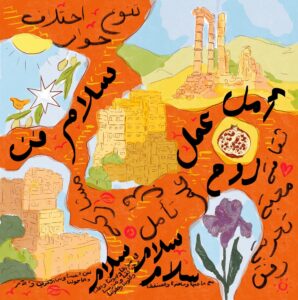We live here, within our people, between mountains and oceans. For generations, beyond language and traditions, our elders taught us peace. They taught us what their parents learned from their parents. We learned how our ancestors existed and lived in peace. We learned how they cemented peace in the community to ensure our existence would come. Now that I am here, Peace Starts Here. When my children come, I will teach them that Peace Starts Here.
Within all the hope that keeps us going in life, there’s some fear that maybe all the peacebuilding we do, day-in and day-out is not working. That maybe we’re building peace in a world that refuses to know peace. With how the world is behaving, our resilience in defying injustice and keeping the hope of peace alive comes across as a fallacy or even a delusion. But for communities whose existence is on the line, who live under the constant buzz of warplanes, what other option do they have? They’re already deprived of the dignity of life; must we also deprive them of the hope of peace?
It’s our way of saying that we are here, and we are peace. Peace starts here because for years we were told how to build it, strive for it and where to find it.

Hope, peace, art, difference, diversity, discussion, culture, spirit, love, experience: “with our past, present and future”, by Diana Ishaqat
Peace Starts Here is not a mere chant. It’s not dreamy or imaginative. It’s real and bold, just like us. At the same time, the sheer capacity to come up with the collective effort to campaign, when the news and apathy are nearly paralyzing is a result of surviving imagination; the one thing that if we still have, then not all is lost. Because it is in our inner worlds that we can envision not only alternatives, but what we deserve and what could be and is ours.
Peace, for us, is not a trend, it’s not a thematic focus, an agenda item, a report section, a box to tick, or an argument to win. For us, peace is life. The love we have for each other, the poems we write, the trees we plant, and the songs we hum. Our pieces of resistance. Our expressions of existence. Our way to peacefully defy the conditions of violence we were put under.
Does our belief sound like there’s nothing novel about it? But there is. War is increasingly just a fact of life, just the way things are for some of us, a segment in the news, a passive reading in the bus on the way somewhere. When it is not nature, it is manmade and is therefore preventable and stoppable.
For six months now and while the world shamelessly mourns the genocide of Palestinians, it feels baseless and almost tone deaf to declare that Peace Starts Here. But with our campaign, the ask is simple: if you want peace on the ground, listen to the people on the ground. With Peace Starts Here, we want to silence the unnecessary noise of foreign entities who pretend to know best and direct the spotlight towards the people on the ground. People who report events for the rest of the world, save lives, organise humanitarian aid, mourn with their neighbours, and lend a shoulder to those who need it, all while making sense of the war. In a world where genocide and violence are excused and debated, peace starts with them.
Strangely it is where war is a reality that people trust one another the most. A part of the live streaming of the tragedy unfolding before our eyes is happening because somewhere under the rubble of the collapsed moral systems someone wants their story out. How can we ignore such a plea?
By Amal Atrakouti and Diana Ishaqat.
